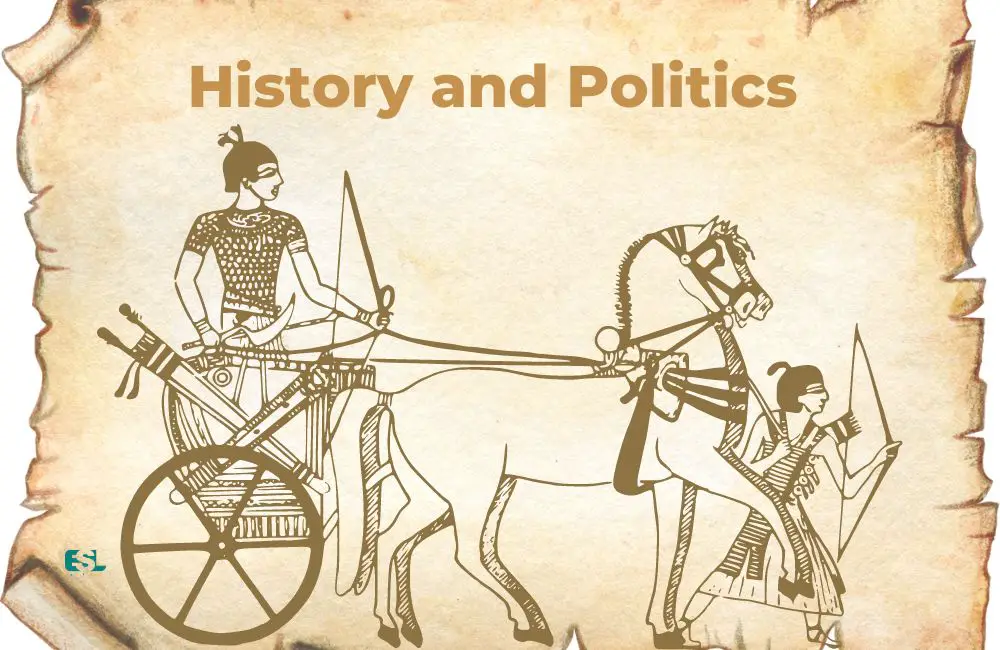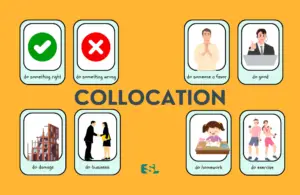Understanding our world’s political landscape and historical nuances can be a complex task, especially when the language used often seems obscure or specialized. However, having a firm grasp on vocabulary specific to these fields is integral to deepening your knowledge and insights.
This comprehensive article aims to guide you through some essential words and phrases in the realms of history and politics, divided into thematic categories for easier reference.
Table of Contents
- 1. Political Systems and Ideologies
- 2. Government and Legislation
- 3. Political Parties and Elections
- 4. Diplomacy and International Relations
- 5. Historical Periods and Events
- 6. Historical and Political Figures
- Sample Conversation: Using Vocabulary Related to History and Politics
- Conclusion
- FAQ: Vocabulary Related to History and Politics
1. Political Systems and Ideologies
Political systems and ideologies have shaped societies and nations throughout history. Here are some key terms to help you navigate this domain.
| Word/Phrase | Meaning/Usage | Example Sentences |
|---|---|---|
| Democracy | A system of government where the citizens exercise power by voting | “In a democracy, every vote counts.” |
| Autocracy | A system of government by one person with absolute power | “The country suffered under the autocracy of the dictator.” |
| Socialism | A political and economic theory advocating for community or state ownership and administration of production and distribution of goods | “Under socialism, wealth is distributed more evenly across society.” |
| Capitalism | An economic and political system where trade and industry are controlled by private owners for profit | “Capitalism encourages competition and innovation.” |
| Theocracy | A form of government in which a deity is recognized as the supreme civil ruler | “The theocracy ruled that religious laws were above civil laws.” |
| Oligarchy | A small group of people having control of a country, organization, or institution | “The oligarchy had a monopoly on political power.” |
| Populism | A political approach that strives to appeal to ordinary people who feel their concerns are disregarded by established elite groups | “His campaign used populism to connect with the working class.” |
| Libertarianism | An extreme laissez-faire political philosophy advocating only minimal state intervention in the lives of citizens | “Libertarianism promotes individual freedom and autonomy.” |
| Nationalism | Identification with one’s own nation and support for its interests, especially to the exclusion or detriment of the interests of other nations | “Nationalism played a major role in the country’s decision to declare independence.” |
| Totalitarianism | A system of government that is centralized and dictatorial and requires complete subservience to the state | “In a totalitarian regime, individual freedoms are often suppressed.” |
To elevate your vocabulary in just 30 days, I recommend to my students an informative, fun, and accessible guide to utilizing powerful language. Millions of individuals have enhanced their academics, job skills, and confidence by dedicating just fifteen minutes daily to the exercises and tests of 30 Days to a More Powerful Vocabulary (Amazon Link), a top-selling. It offers step-by-step methods to bolster language prowess, discover compelling words, and daily vocabulary enhancement with pronunciation guidance.
2. Government and Legislation
Understanding the language of government and legislation is crucial to comprehend the mechanisms that control societies and create laws.
| Word/Phrase | Meaning/Usage | Example Sentences |
|---|---|---|
| Constitution | A body of fundamental principles or established precedents according to which a state or other organization is acknowledged to be governed | “The constitution guarantees freedom of speech.” |
| Referendum | A general vote by the electorate on a single political question which has been referred to them for a direct decision | “The government held a referendum on the issue of healthcare reform.” |
| Legislation | Laws, considered collectively | “The new legislation on climate change is a step in the right direction.” |
| Congress | The national legislative body of a country | “The bill was passed by Congress.” |
| Parliament | A country’s legislative (law-making) body | “The UK Parliament is divided into the House of Commons and the House of Lords.” |
| Executive | A part of government that has sole authority and responsibility for the daily administration of the state | “The President is the head of the executive branch.” |
| Judiciary | The judicial authorities of a country; judges collectively | “The judiciary is an independent arm of government.” |
| Bicameral | A legislative body having two branches or chambers | “The United States has a bicameral legislature.” |
| Filibuster | An action such as prolonged speaking which obstructs progress in a legislative assembly in a way that does not technically contravene the required procedures | “The senator’s filibuster delayed the vote on the bill.” |
| Quorum | The minimum number of members of an assembly or society that must be present at any of its meetings to make the proceedings of that meeting valid | “Without a quorum, the committee couldn’t vote on the issue.” |
3. Political Parties and Elections
Political parties and elections form the backbone of democratic societies. This section provides some vital vocabulary in this area.
| Word/Phrase | Meaning/Usage | Example Sentences |
|---|---|---|
| Primary | An election where party members select candidates to run for political office | “The candidate performed well in the primary.” |
| Caucus | A meeting of the members of a legislative body who are members of a particular political party, to select candidates or decide policy | “The party caucus decided on the key issues for the campaign.” |
| Bipartisan | Of or involving the agreement or cooperation of two political parties that usually oppose each other’s policies | “The bill passed with bipartisan support.” |
| Gerrymandering | Manipulate the boundaries of an electoral constituency so as to favor one party or class | “Critics accused the party of gerrymandering to win the election.” |
| Ballot | A process of voting, in writing and typically in secret | “She cast her ballot in the local elections.” |
| Incumbent | The current holder of an office or position, often in relation to an election | “The incumbent mayor was re-elected for another term.” |
| Swing state | A US state where the two major political parties have similar levels of support among voters, viewed as important in determining the overall result of a presidential election | “Candidates spend a lot of time campaigning in swing states.” |
| Plurality | In an election, the number of votes that the leading candidate obtains over the next highest candidate | “He won the election by a plurality, not a majority.” |
| Landslide | An overwhelming majority of votes for one party in an election | “She won the election by a landslide.” |
| Exit poll | A poll of people leaving a polling place, asking how they voted | “Exit polls predicted a victory for her.” |
4. Diplomacy and International Relations
These words and phrases are often used when discussing diplomacy and international relations, concerning how nations interact and negotiate.
| Word/Phrase | Meaning/Usage | Example Sentences |
|---|---|---|
| Diplomacy | The profession, activity, or skill of managing international relations | “Diplomacy is crucial in preventing conflicts.” |
| Treaty | A formally concluded and ratified agreement between countries | “The treaty established peace between the two nations.” |
| Alliance | A union or association formed for mutual benefit, especially between countries or organizations | “The two countries formed an alliance to boost trade.” |
| Sanctions | Measures taken by countries against others for political reasons, often involving trade restrictions | “Sanctions were imposed to pressure the country to change its policy.” |
| Diplomatic immunity | Special privileges accorded to diplomats by the host country, exempting them from certain laws | “The diplomat was not arrested due to diplomatic immunity.” |
| Summit | A meeting between heads of government | “The world leaders discussed climate change at the summit.” |
| Interventionism | A policy of non-defensive activity undertaken by a nation-state, or other geopolitical jurisdiction of a lesser or greater nature, to manipulate an economy and/or society | “The country’s interventionism was seen as an attempt to control its neighbor.” |
| Sovereignty | The authority of a state to govern itself or another state | “The region fought for sovereignty and independence.” |
| Proxy war | A war instigated by a major power that does not itself become involved | “The two superpowers were accused of fighting a proxy war.” |
| Neutrality | The state of not supporting or helping either side in a conflict or disagreement | “Switzerland is known for its policy of neutrality.” |
5. Historical Periods and Events
Understanding key terms related to historical periods and events can help you understand the context and narratives of different epochs and significant occurrences.
| Word/Phrase | Meaning/Usage | Example Sentences |
|---|---|---|
| Renaissance | A period in European history marking the transition from the Middle Ages to Modernity | “The Renaissance is known for its advancements in art, literature, and science.” |
| Industrial Revolution | The rapid development of industry that occurred in Britain in the late 18th and 19th centuries, brought about by the introduction of machinery | “The Industrial Revolution marked a major turning point in history.” |
| Cold War | The state of political hostility that existed between the Soviet bloc countries and the US-led Western powers from 1945 to 1990 | “The Cold War led to major political changes worldwide.” |
| World War | A war engaged in by all or most of the principal nations of the world, specifically the two wars that took place between 1914–18 and 1939–45 | “World War II ended with the unconditional surrender of the Axis powers.” |
| Colonialism | The policy or practice of acquiring full or partial political control over another country, occupying it with settlers, and exploiting it economically | “Colonialism has left lasting effects on many countries.” |
| Enlightenment | A European intellectual movement of the late 17th and 18th centuries emphasizing reason and individualism rather than tradition | “The Enlightenment led to revolutions in thought in both science and politics.” |
| Reformation | A 16th-century movement for the reform of abuses in the Roman Catholic Church ending in the establishment of the Reformed and Protestant Churches | “Martin Luther was a key figure in the Reformation.” |
| Middle Ages | The period of European history from the fall of the Roman Empire in the West to the fall of Constantinople | “The Middle Ages was a time of significant social change.” |
| Civil Rights Movement | A struggle by African Americans in the mid-1950s to late 1960s to achieve civil rights equal to those of whites, including equal opportunity in employment, housing, and education | “The Civil Rights Movement led to major legal changes in America.” |
| Genocide | The deliberate killing of a large number of people from a particular ethnic or national group | “The Holocaust was an act of genocide.” |
6. Historical and Political Figures
History and politics are filled with individuals who have left indelible marks on our world. Here are some terms related to roles and descriptions of these figures.
| Word/Phrase | Meaning/Usage | Example Sentences |
|---|---|---|
| Monarch | A sovereign head of state, especially a king, queen, or emperor | “The monarch’s role was largely ceremonial in the constitutional monarchy.” |
| Dictator | A ruler with total power over a country, typically one who has obtained control by force | “The dictator ruled with an iron fist.” |
| Revolutionary | A person who works for or engages in political revolution | “The revolutionary dedicated his life to fighting for freedom.” |
| Statesman | A skilled, experienced, and respected political leader or figure | “He was a statesman known for his diplomatic skills.” |
| Tyrant | A cruel and oppressive ruler | “The tyrant was overthrown by the people he oppressed.” |
| Martyr | A person who is killed because of their religious or other beliefs | “He was seen as a martyr after he was killed while fighting for civil rights.” |
| Despot | A ruler or other person who holds absolute power, typically one who exercises it in a cruel or oppressive way | “The despot ruled by fear and intimidation.” |
| Humanitarian | A person who seeks to promote human welfare | “She is a well-known humanitarian who has spent her life helping others.” |
| Conqueror | A person who conquers a place or people | “Alexander the Great was a famous conqueror.” |
| Peacemaker | A person who brings about peace, especially by reconciling adversaries | “The diplomat acted as a peacemaker during the negotiations.” |
If you are searching for an effective English language vocabulary builder, try Word Power Made Easy: The Complete Handbook for Building a Superior Vocabulary (Amazon Link). This time-tested classic has helped millions achieve mastery of English and improve their communication skills in business, the classroom, and in life.
Sample Conversation: Using Vocabulary Related to History and Politics
Situation: At a book club meeting, Mia and Theo discuss a historical novel that delves into the politics of the Renaissance era.
Mia: Theo, I was utterly engrossed in this book’s portrayal of “monarchies” and “empires” during the Renaissance. The way the “sovereigns” interacted with their “constituents” was so different from today’s “republics.”
Theo: I agree, Mia. The intricate “diplomacy” and political “alliances” of that time are fascinating. The balance between “autocracy” and the emergence of early “democratic” ideals made for such compelling narratives.
Mia: True. And the role of “propaganda” in shaping public opinion, even in those days, is a testament to the power of information and “rhetoric.”
Theo: Absolutely. The “treaties” and “conventions” they established, driven by both “ideology” and “geopolitical” interests, still influence modern politics. It’s a reminder of how intertwined history and politics truly are.
Mia: It makes me wonder how future “historians” will interpret our current political “regimes” and “revolutions.” History, after all, is written by the victors.
Conclusion
Language is a powerful tool for understanding the world around us. Knowing the right vocabulary can transform complex historical and political contexts into comprehensible narratives. This list of terms, covering different aspects of history and politics, is by no means exhaustive.
However, it provides a solid foundation for anyone interested in delving deeper into these intriguing fields. Always remember, the more we understand, the more informed our perspectives and actions become. Happy learning!
FAQ: Vocabulary Related to History and Politics
1. What does “monarchy” mean in a historical context?
A “monarchy” is a form of government where a single person, often a king or queen, rules the country. The position is usually hereditary, passing down within a royal family.
2. How does an “empire” differ from a “kingdom”?
An “empire” refers to a group of nations or peoples ruled over by a single monarch or sovereign state, often achieved through conquests. In contrast, a “kingdom” is a single nation or territory ruled by a king or queen.
3. Who are “sovereigns”?
“Sovereigns” are supreme rulers, especially monarchs, who possess ultimate authority over their domain.
4. What is the role of “constituents” in politics?
“Constituents” are the people who live and vote in an electoral district. Politicians are elected to represent the interests of their constituents.
5. How does “autocracy” differ from “democracy”?
“Autocracy” is a system of government in which one person possesses unlimited power, whereas “democracy” is a system where citizens participate in decision-making, often through elected representatives.
6. What is “propaganda” in a political context?
“Propaganda” refers to information, especially biased or misleading, used to promote a political cause or point of view.
7. How do “treaties” shape international relations?
“Treaties” are formal agreements between countries that establish obligations and relationships. They play a pivotal role in maintaining peace, establishing trade relationships, and setting international norms.
8. What does “geopolitical” mean?
“Geopolitical” relates to the study of the effects of geography on international politics and relations. It examines the interplay between political decisions and geographical factors.
9. How do “historians” contribute to our understanding of the past?
“Historians” study and interpret the past, often using various sources like documents, artifacts, and oral histories. Their analyses help us understand historical events, cultures, and societies.
10. What are political “revolutions”?
“Revolutions” are significant and often abrupt changes in a society’s political and social structures, typically resulting from resistance against the prevailing order.






